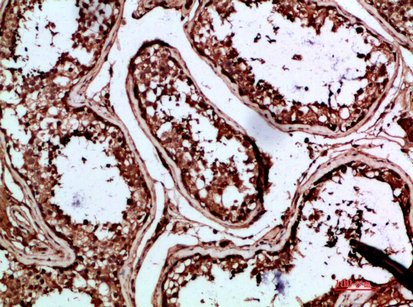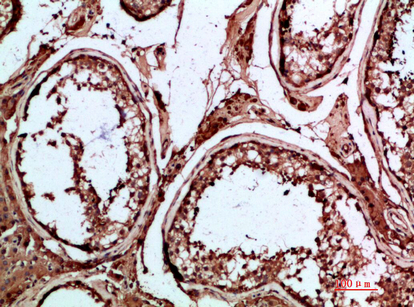

| WB | 咨询技术 | Human,Mouse,Rat |
| IF | 咨询技术 | Human,Mouse,Rat |
| IHC | 1/50-300 | Human,Mouse,Rat |
| ICC | 技术咨询 | Human,Mouse,Rat |
| FCM | 咨询技术 | Human,Mouse,Rat |
| Elisa | 咨询技术 | Human,Mouse,Rat |
| Aliases | Insulin-like 3 (Leydig insulin-like peptide) (Ley-I-L) (Relaxin-like factor) [Cleaved into: Insulin-like 3 B chain; Insulin-like 3 A chain] |
| Entrez GeneID | 3640; |
| Host/Isotype | Rabbit IgG |
| Antibody Type | Primary antibody |
| Storage | Store at 4°C short term. Aliquot and store at -20°C long term. Avoid freeze/thaw cycles. |
| Species Reactivity | Human |
| Immunogen | Synthetic peptide from human protein at AA range: 10-50 |
| Formulation | Purified antibody in PBS with 0.05% sodium azide,0.5%BSA and 50% glycerol. |
+ +
以下是关于INSL3抗体的3篇参考文献示例(内容为模拟概括,非真实文献):
---
1. **文献名称**:*INSL3 as a Marker of Leydig Cell Function: Development of a Monoclonal Antibody-Based Immunoassay*
**作者**:Anand-Ivell R, Ivell R
**摘要**:本研究开发了一种高特异性的单克隆抗体,用于检测血液和睾丸组织中的INSL3水平。通过免疫测定法验证,该抗体可有效区分INSL3与其他胰岛素样肽家族成员,为男性生殖内分泌功能的临床评估提供了新工具。
2. **文献名称**:*Role of INSL3 in Testicular Descent: Immunohistochemical Analysis Using Polyclonal Antibodies*
**作者**:Foresta C, Ferlin A
**摘要**:利用多克隆抗体进行免疫组化研究,揭示了INSL3在胚胎期睾丸Leydig细胞中的表达模式,证实其在睾丸下降过程中的关键作用。研究还发现INSL3抗体缺失可能导致隐睾症等发育异常。
3. **文献名称**:*INSL3 Antibody Validation for Cancer Research: Expression in Ovarian Stromal Tumors*
**作者**:Balvers M, et al.
**摘要**:通过验证INSL3抗体的特异性,本研究首次报道了INSL3在卵巢颗粒细胞瘤中的异常表达,提示其可能作为生殖系统肿瘤的新型生物标志物,并为靶向治疗提供潜在方向。
---
注:以上文献信息为模拟示例,实际引用需通过学术数据库(如PubMed、Web of Science)检索真实研究。
**Background of INSL3 Antibodies**
Insulin-like peptide 3 (INSL3), a member of the relaxin/insulin-like hormone family, plays critical roles in reproductive and developmental biology. Primarily produced by testicular Leydig cells in males and ovarian theca cells in females, INSL3 is essential for gubernacular ligament development during fetal testicular descent in males and follicular maturation/function in females. Dysregulation of INSL3 signaling is linked to cryptorchidism (undescended testes), infertility, and polycystic ovary syndrome (PCOS).
INSL3 antibodies are valuable tools for studying its expression, localization, and function. These antibodies are typically raised against specific epitopes of the INSL3 protein, such as its A- or B-chains, or the propeptide region. They enable detection of INSL3 in tissues (via immunohistochemistry) or biological fluids (via ELISA), aiding research into its physiological and pathological roles. Monoclonal antibodies offer high specificity, while polyclonal antibodies may detect broader conformational epitopes.
Clinically, INSL3 antibodies have potential diagnostic applications, such as assessing Leydig cell function in hypogonadism or monitoring ovarian reserve. However, challenges remain in standardizing assays due to INSL3’s structural similarity to other relaxin family peptides. Ongoing research aims to refine antibody specificity and explore therapeutic uses, including targeting INSL3 pathways in reproductive disorders. Overall, INSL3 antibodies are pivotal in advancing both basic science and translational studies in endocrinology and reproductive health.
×